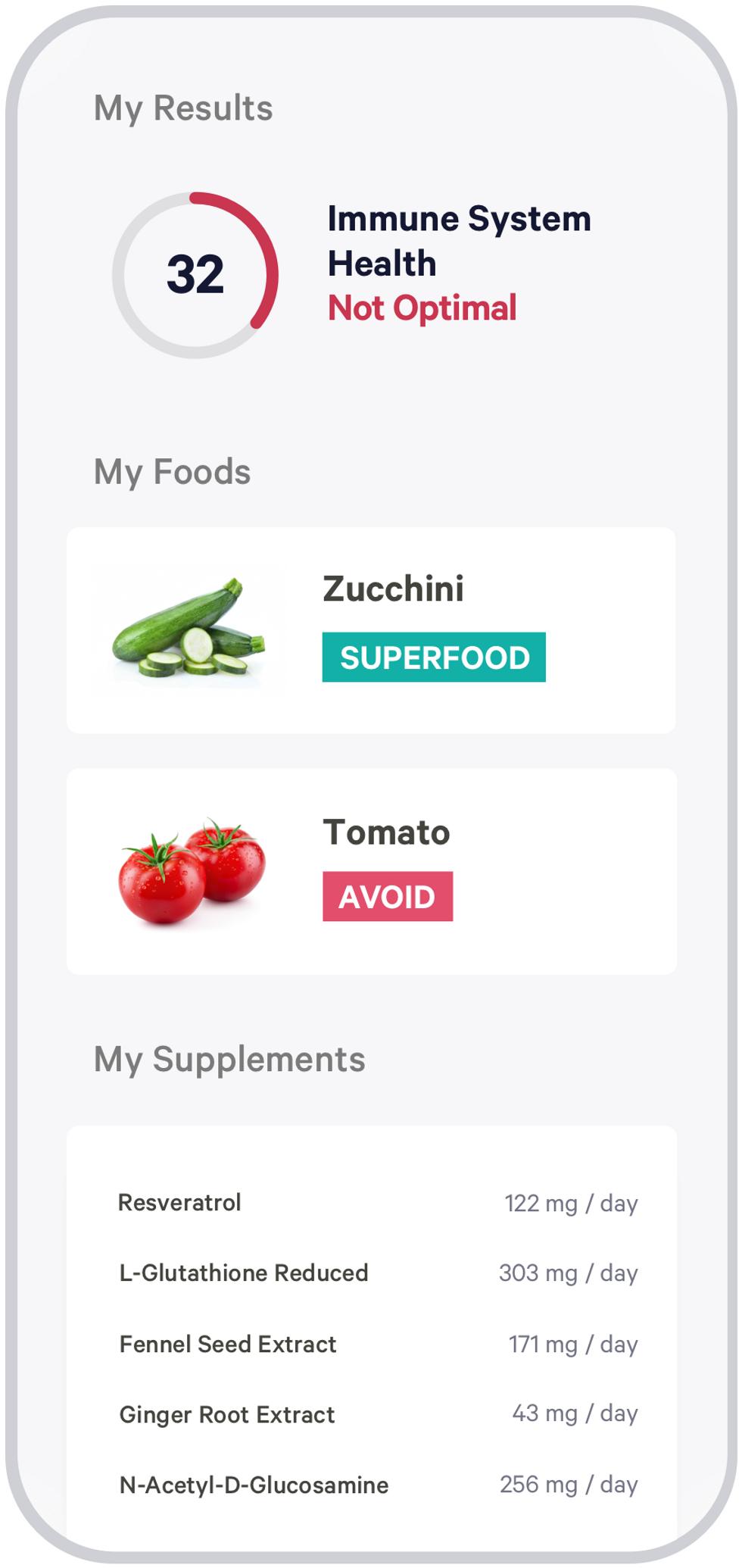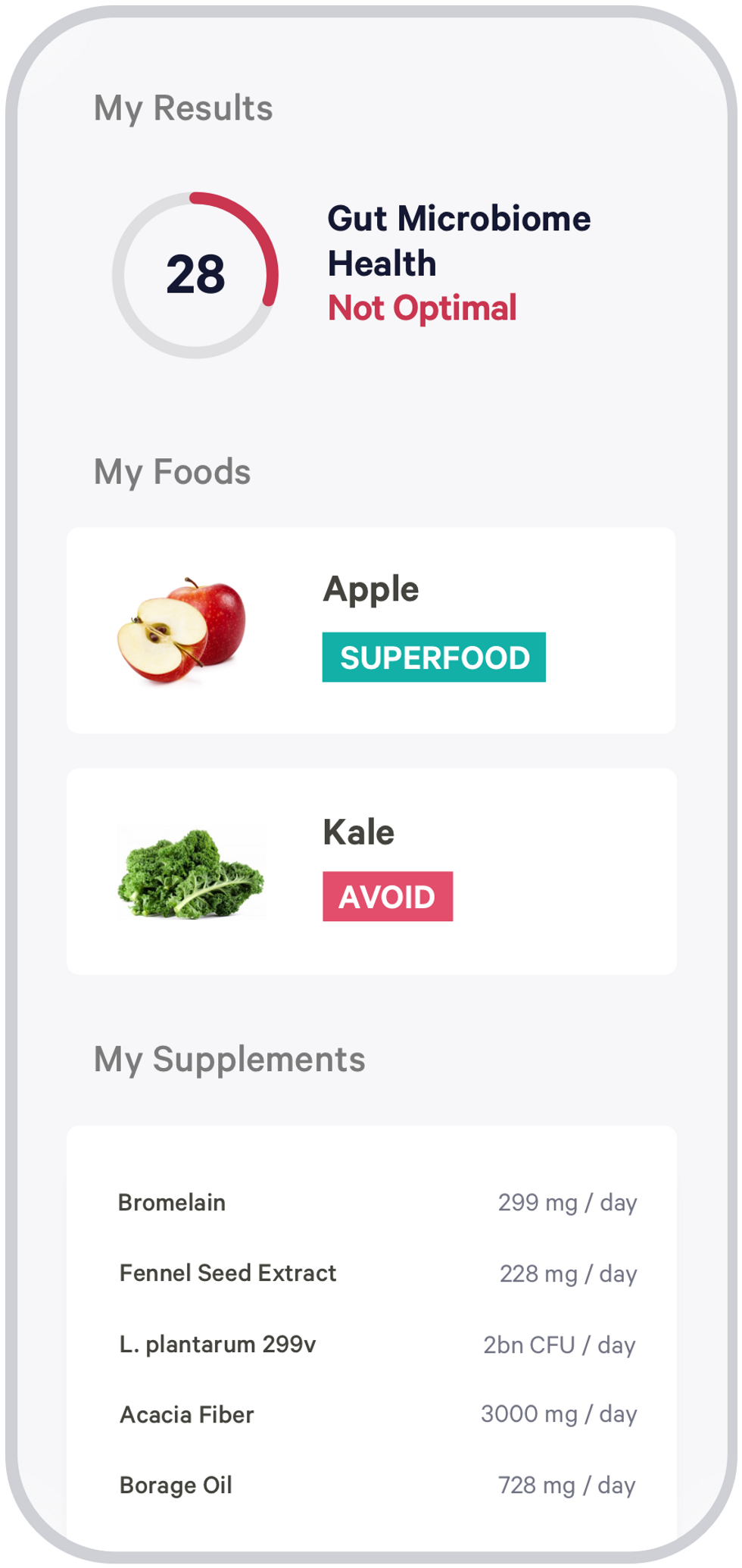How This At-Home Test Helped Get Rid Of My Constant Bloating
Viome’s microbiome test promises to solve chronic diseases.

“I’m so bloated.” I uttered that tiny little sentence more times throughout the last decade than I’d like to admit—so much so that my friends started calling it my catchphrase. For the last 10-plus years, I’ve oscillated from blaming my diet, then stress, then travel. I’d often go days or even weeks without going to the bathroom, so I made an appointment with a gastro. He couldn’t find anything wrong, but referred me to another, who told me I was probably just allergic to dairy, and that I should give up cheese and take Lactaid. That helped with acute backup, but didn’t solve the root issue which was present more often than not. A third gastro prescribed me a heavy-duty daily laxative, which from a cursory Google search seemed like an awful Band-Aid for an even worse problem. I finally saw a holistic doctor who tested my blood and told me with joy that I was sensitive to eggs, dairy, and nightshades like peppers and tomatoes—two foods I ate often. She told me to adopt a low-FODMAP diet, a solution that’s typically meant for sufferers of IBS or SIBO (neither of which I had), which made me feel better and then way, way worse. Eventually, she too prescribed me an over-the-counter laxative, though this one had pretty, millennial pink packaging, not dissimilar to the Fit Teas that permeated every Instagram feed in 2016. With the help of more doctors, we ruled out PCOS, Crohn’s, colitis, and myriad other diseases that can be found through routine testing.
You can probably see my issue here. Fed up, I recently Googled myself into a microbiome K-hole, and at the center of it was Viome, an at-home testing kit with the goal to prevent and reverse chronic diseases by starting with the gut microbiome. I was equally curious and suspicious. Microbiome is a fairly new buzzword, even if it’s been around for a while—but what exactly does it mean?
“Your gut microbiome is the constellation of the microorganisms inside our GI tract such as bacteria, fungi, and viruses,” says Dr. Ali Rezaie, Medical Director of the Gastrointestinal Motility Program at Cedars-Sinai, Los Angeles. Her book, The Microbiome Connection, came out this month. “We have more bacterial cells in our gut than we have human cells in our bodies. These microorganisms are constantly communicating and networking with us and each other. They affect the function of our body and can produce a myriad of side products that can get absorbed and subsequently affect us.”
Of course, the definition of “affect us” can vary between slight bloating, acne breakouts, IBS, or chronic inflammatory bowel disease like Crohn’s or colitis. Viome Founder Naveen Jain, an entrepreneur with a background in tech, launched Viome in 2016 with the goal of eradicating chronic diseases—quite the feat for a $199 at-home test. He later joined forces with Grant Antoine, ND, Viome's Translational Science Clinical Expert, to fine-tune the science behind the company's big goal. “No one has ever cured an autoimmune disease—you’re supposed to just take a drug for the rest of your life,” Jain tells me. “With chronic diseases, you take medicine for the rest of your life. You have diabetes, you take insulin for the rest of your life. You have high blood pressure, you take a beta blocker for the rest of your life. I wanted to stop that cycle.”
With more than a third of the general population suffering from at least one gastrointestinal disease and many more on the rise, according to Rezaie, there’s a lot of room for growth. “While the exact etiology remains unclear, changes in the microbiome have been strongly implicated in the pathogenesis of these diseases. For example, after a bout of food poisoning, there’s an 11% chance of developing irritable bowel syndrome (IBS). Needless to say, the rate of food poisoning is on the rise with the global change in traveling and eating habits which will continue to fuel more and more cases of IBS.”
The test isn’t exactly fun to take, but it’s no worse than an in-office blood draw. After you self-administer a blood test to gather five small vials, you have to go to the bathroom on a paper-catching apparatus then scoop a sample into another vial. In the name of journalism, I did both. (Viome is adding an oral swab component come June.) The app’s questionnaire about eating, sleeping, and other health habits took about 15 minutes to complete, and it was more thorough than anything a doctor had ever asked me. I filled in everything from medications I take to the frequency and type of bowel movement I have, among other related habits.
“The initial focus of Viome was on the organisms and their function living in the human GI tract,” says Antoine. “Recently the focus of research on the oral microbiome has shifted from its local mouth cavity and tooth effects to a beginning understanding of its association with chronic diseases of the whole body. In fact, oral microbiome is now being listed as being equally important with most digestive diseases, mental health disease, neurodegenerative diseases, and many types of cancers.”
Within two weeks, I had my results back—all 98 pages of them—and they weren’t great: coffee was wreaking havoc on my insides, and I needed to give up cucumbers STAT. In addition to showing you the foods that you should avoid, Viome breaks your diet down into three other sections: Minimize, Enjoy, and Superfoods. While this isn’t the traditional “good” and “bad” labeling that’s so pervasive with diet-speak apps, the app still covertly assigns morality to foods, something that can be problematic for anyone with a history of disordered eating. Still, outside of refined sugars and processed grains, there’s no blanket statement of “good” or “bad” foods, which is a step forward.
Perhaps more telling, though, were metrics like my gut microbiome health (a 44 out off 100, which is in the red); my cellular health (a 31 out of 100, abysmal); my mitochondrial health (34); my immune system health (48); my stress response health (61); my gut lining health (65); and my biological age (25, almost a decade lower than my real age, which is 34.)


Antoine tells me Viome uses a mix of metatranscriptomic sequencing (gene expressions), glycemic response and pathways analysis, and artificial intelligence to categorize foods into their respective categories as well as offer personalized advice. While it’s tough for a layman to understand all the science (trust me, I tried), the app does give a ton of information about why these scores are important. For my gut lining health, for example, it explains, “When your gut lining is compromised, things from the outside environment, like toxins, medications, and harmful bacteria, can make their way into your bloodstream from your gut and negatively affect your immune system and overall well being.”
While things like apples, garlic, artichokes, and grapefruit were listed as superfoods, I decided to go all in and give up coffee for almost a month—probably the hardest part of this entire journey—and skipped cucumbers, black beans, turmeric, and tomatoes, all of which were on my “avoid” list. There’s also a supplement add-on—for about $60/month, you can get personalized, custom-mixed supplements based on your results. (At the recommendation of my doctor, I skipped this part.) While the pages of recommendations are dense, I particularly appreciate that Viome includes related studies published in reputable journals alongside each recommendation for further research.
After nearly a month of following my recommendations, I’m significantly more regular, less bloated, and incredibly less dependent on strenuous workouts to feel like my usual self. Of course, this could be a result of me ditching my salt & vinegar chip habit just as much as it is my dedication to avoiding certain foods as Viome directed.
“We’ve analyzed almost half a million people, and we learned that the things we used to call diseases were just the symptoms of inflammation,” says Jain. “Some people express that as acne, some people express it as sleeping poorly. Some people express it as constipation. Some people express it as diarrhea. Some people would have depression. Other people will have anxiety. All the different symptoms are based on how your microbes are behaving in your body. And once we start to fix the inflammation, people tell us they no longer have eczema. They no longer have acne. They no longer have problems sleeping. They're losing weight. All the things that we thought were diseases would actually completely disappear.”
While at-home microbiome tests do a great job of flagging anything that could be causing inflammation in your body, they don’t often get to the root cause. They can’t tell you definitively if you have a leaky gut, diverticulitis, or any of the myriad issues that can plague a gastrointestinal tract regardless of what you put it in. In fact, some professionals say the foods that show up during these at-home tests are often the ones we eat most often—and it would make sense that if we drink coffee every day and have some sort of gastrointestinal tear like leaky gut, of course our bodies will have created higher levels of antibodies to those foods. Perhaps a better use case for these tests isn’t an at-home food sensitivity test, but rather, a doctor-assisted, in-office test that can pick up cell abnormalities.
“Diagnosis and management of microbiome-related diseases are complex and having a qualified healthcare provider will help you immensely to steer back to health and wellness,” says Rezaie. “Some of the at-home tests such as stool microbiome analysis have not shown to be clinically helpful to diagnose or to tailor management of the GI diseases. This is due to their low sensitivity and also lack of a normal range. Multiple research groups including ourselves are working tirelessly to develop accurate tests to guide treatment and prognosis of GI diseases.”
Either way, if you combine Viome’s learnings with doctor-assisted guidance and an otherwise healthy lifestyle, it’s a great tool for anyone that’s at an impasse with their own digestive health—as long as you don’t get bogged down by all the information available.




